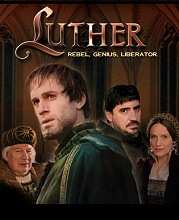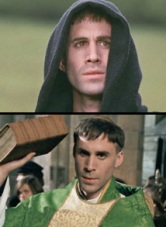| Luther |
| |
 |
Germany, 2003. Rated PG-13.
Cast:
Joseph Fiennes, Peter Ustinov, Alfred Molina, Claire Cox, Jonathan Firth,
Bruno Ganz, Uwe Ochsenknecht, Mathieu Carrière, Marco Hofschneider, Torben
Liebrecht, Jochen Horst, Benjamin Sadler
Writers: Bart Gavigan and Camille Thomasson, based on the play
by John Osborne
Original Music: Richard Harvey
Cinematography: Robert Fraisse
Producers: Brigitte Rochow, Christian Stehr, Alexander Thies
Director: Eric Till
LINKS
|
 ike
it or not—and a lot of people don't—Martin Luther is the most important
religious figure of the last thousand years, or since Mohammed. The father of
all Protestant faiths, Luther set in motion the Reformation when, as a young
priest and theology professor in 1517, he nailed his Ninety-Five Theses denouncing
Papal abuses to the door of the Wittenberg Church. Allegedly nailed, anyway.
ike
it or not—and a lot of people don't—Martin Luther is the most important
religious figure of the last thousand years, or since Mohammed. The father of
all Protestant faiths, Luther set in motion the Reformation when, as a young
priest and theology professor in 1517, he nailed his Ninety-Five Theses denouncing
Papal abuses to the door of the Wittenberg Church. Allegedly nailed, anyway.
However disseminated, his Theses and other writings represented a simple stand
of conscience that set in motion ecclesiastical revolutions and civic upheavals
resulting in church schisms and utterly changing the political landscape of
Europe. Prone to depression, Luther admitted to struggling throughout his life
with evil spirits and the devil. He was particularly appalled by the violence
that resulted from his stand, particularly the slaughter of 100,000 peasants
after he urged the German princes to restore order. Because of these misgivings
and his plain doctrine that Christ is found in the Gospels, only the Gospels,
and not through intermediaries like the Pope, he steadfastly resisted attempts
to turn him into a saint and an icon.
Ralph Fiennes would be an ideal choice to portray this man. Few actors do the
tormented soul thing better, as The End
of the Affair, The English Patient, and even Schindler's
List attest. In the right roles, Fiennes is an electric performer, opening
windows into his character's inner shadows without falling prey to exaggeration.
Fiennes would be an incandescent Luther.
Unfortunately it is not Ralph Fiennes who plays Luther, but his younger brother
Joseph. He wears a constant expression for much of the film: a slight frown
above a set mouth, with his large, dark eyes focused on a point about four feet
in front of him. Pain? Slight frown, set mouth, eyes focused four feet in front
of him. Shock? Slight frown, set mouth, eyes focused four feet in front of him.
Conflicted distress? Slight frown, set mouth, eyes focused four feet in front
of him. As Luther, Joseph Fiennes is merely adequate. With his smoldering dark
looks, he can portray a certain romanticized anguish, but lacks the chops to
make the performance transcendent.

Joseph Fiennes stars as Martin Luther |
In addition to a transcendent performance, Luther could have used a
more focused script. A concise screenplay that distills the essence of Luther's
life coupled with a little experimentation could have made Luther into
a stirring affirmation of faith akin to, say, Martin Scorcese's religious films
(The Last Temptation of Christ and Kundun). There are certainly
parallels to the life of Christ. Luther's visit to Rome recalls Christ's visit
to the temple in Jerusalem when he expelled the moneychangers. The times Luther
wrestles with himself alone in his cell recalls similar scenes in Last Temptation
of Christ, as does Luther finally shedding his religious garb and marrying.
Director Eric Till doesn't push the Christ angle, though, and Luther himself
would no doubt have been appalled if he had.
Instead, Luther goes the standard bio-pic route, and suffers from bio-pic-itis
as a result. What is bio-pic-itis? It is when, in an attempt to be comprehensive
and faithful to a person's life, a movie crams in a whole bunch of information
and events at the expense of coherent thematic delineations, a central organizing
principle, and depth.
None of this is to say that Luther is a bad film, just a slightly disappointing
one given the meaty subject matter. It's tremendously informative, for instance,
if it is possible to judge movies by such a standard. We see all the major events
of Luther's life—his vow to devote his life to God during a violent thunderstorm,
his entry into the order of the Augustinian Hermits in Erfurt, his joining the
faculty at Wittenberg University, his campaign against the Church's sale of
indulgences (which supposedly assured a place in heaven for the purchaser, or
a relative), the pressure on him to recant and his appearance before the Imperial
Diet of Worms in 1521, his excommunication, and his translation into the German
vernacular of the scriptures, which were previously inaccessible to common people
by the Church's design. It is astounding to think about the kind of ignorance
and docility people must have lived in to accept the abuses foisted on them
by the Church in those times.
It is also troubling what is not touched on in the film, such as Luther's virulent
anti-Semitism, which was commonplace at the time but disturbing nonetheless.
On Jews and Their Lies, which Luther wrote in 1543, is a vile, vituperative
document in which he excoriates the Jews for pride and racism while exhibiting
the same traits. (To be fair, he also produced conciliatory works like Jesus
Christ Was Born a Jew.)
The superficiality necessitated by such a full script means a nagging lack
of understanding of the German princes' motives in supporting Luther and defying
their emperor, Charles V (Torben Liebrecht), particularly those of Frederick
the Wise (Sir Peter Ustinov), who positions himself as Luther's protector while
subtly defying the Emperor he strongly fears. Similarly, Luther does
not clearly show how and why Luther urges the princes to suppress the rebellions
sparked by his writings and led by his former university colleague Carlstadt
(Jochen Horst). We see only his shock beforehand and guilt at the subsequent
death toll.
It is not fair, however, to characterize Luther as a pedestrian recitation
of events. Sprinkled throughout the film are distinctive moments that hint at
the passion and otherworldliness that we would expect at the heart of such a
story. The thunderstorm at the beginning of the film, for example, when Luther
is almost struck by lightning. The way an overwhelmed Luther's hands shake at
the first Mass he gives, causing him nearly to drop the bread and wine. The
light of the outside sky replacing the head of the Madonna when a rock is thrown
through a stained glass window.
Luther is further strengthened by the uniformly solid supporting cast,
with Ustinov lending his character a depth not fully written into the script,
and Bruno Ganz expressively representing the troubled affection Johann von Staupitz
feels for his protégé in the Augustinian Hermits. Claire Cox makes a strong
Katharina von Bora (Luther's eventual wife), in contrast to Liebrecht, who makes
a suitably weak Emperor. As the villains, Uwe Ochsenknecht (playing Pope Leo
XII) and Jonathan Firth (the Pope's underling Girolamo Aleandro) are distasteful
without being cartoonish, while Alfred Molina appears in a too-small role as
indulgence-vendor Johann Tetzel, with his absurd rhymes—"When a coin in
the coffer rings, a soul from Purgatory springs!" Finally, the score is unmemorable
but well chosen orchestral music with pipes and other instruments that effectively
evoke the period.
The bottom line is that Luther is a reasonably solid account of a fascinating
figure's life that leaves an audience wishing for more—or less. More running
time, to tell the story better and fully understand all the characters, the
kind of time that a television miniseries could provide. Or less story, to concentrate
less on events and more on Luther the man, who he was and why he told the world,
as legend has it, "Here I stand. I cannot do otherwise."
Review
© September 2003 by AboutFilm.Com and the author.
Images © 2003 RS Entertainment. All Rights Reserved.


